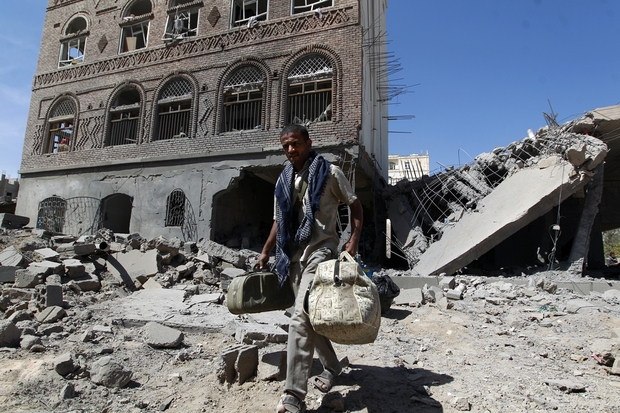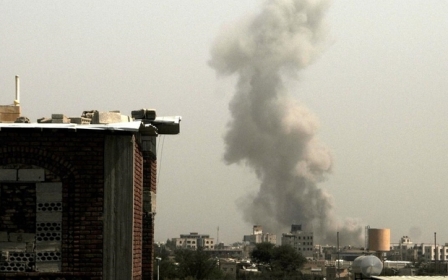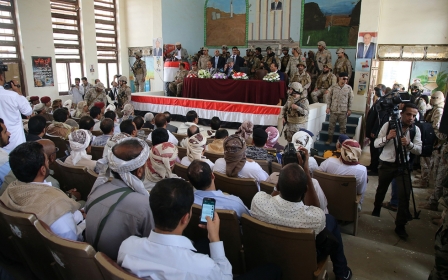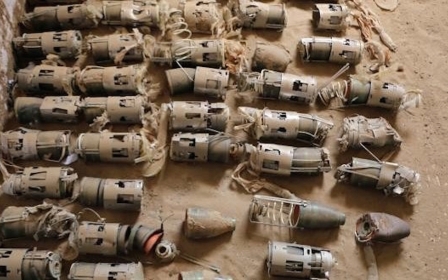Saudi-led coalition lashes out at reports of Yemen aid blockade

The Saudi Arabian-led coalition battling Houthi rebels in Yemen has lashed out at rights groups' evidence that it is causing a humanitarian catastrophe in the country by blocking aid and goods bound for the country.
In a statement on Friday, the coalition singled out Human Rights Watch and Paris-based Doctors Without Borders for "belittling the efforts of coalition forces and their positive role in delivering humanitarian aid and facilitating access for commercial goods and fuel products".
Both groups have gathered evidence that the coalition's blockade of sea and air routes into the country was having a severe impact on civilians.
Human Rights Watch said half the population of Yemen faces food shortages, and that the coalition-imposed blockade "may amount to the war crime of starvation of civilians as a method of warfare".
Doctors Without Borders meanwhile reported that restrictions on imports "have badly affected Yemen’s health system and its ability to provide sufficient lifesaving medications to those medical facilities that still function".
The Riyadh-based coalition, however, denied the rights groups' evidence.
"The coalition is not imposing a siege or an economic boycott on Yemeni territory," it said in its statement, adding that it was "fulfilling its duties towards implementing UN resolutions that aim to prevent weapons and ammunition" reaching Yemen.
"Coalition forces give immediate and regular permits to all aid ships to reach all Yemeni ports, without being inspected," said the statement released late on Friday.
The "humanitarian catastrophe" in Yemen was not caused by a lack in food or fuel supplies but rather a "black market" set up by Houthis, the coalition said.
About 2.8 million people have been forced from their homes in Yemen and more than 80 percent of the population urgently needs humanitarian aid, according to UN figures.
More than 6,400 people have been killed in Yemen since the Saudi-led coalition intervened in support of Hadi's government.
HRW earlier this month said the coalition was breaking international law by bombing civilian economic infrastructure.
The coalition launched a military campaign against Yemen's Shia rebels in March last year after the insurgents advanced on President Abd Rabbuh Mansour Hadi's refuge in Aden. The insurgents had overrun the capital Sanaa in September 2014.
UN-brokered peace talks in Kuwait collapsed after representatives from the Yemeni government said they will leave on Saturday, signalling the end of four months of indirect negotiations with Houthi rebels.
The Houthi rebels and the General People's Congress of former president Ali Abdullah Saleh on Thursday jointly announced setting up a 10-member council.
The job of the council would be to "manage state affairs politically, militarily, economically, administratively, socially and in security," a statement issued by the Houthis said.
UN special envoy Ismail Ould Cheikh Ahmed said the rebels' move "contravenes" their commitment to the peace process and "represents a grave violation" of UN Security Council Resolution 2216 on Yemen's conflict.
Indirect negotiations held in Kuwait since April have failed to make headway. Most of the discussions focused on the type of government to run Yemen during a transition period.
New MEE newsletter: Jerusalem Dispatch
Sign up to get the latest insights and analysis on Israel-Palestine, alongside Turkey Unpacked and other MEE newsletters
Middle East Eye delivers independent and unrivalled coverage and analysis of the Middle East, North Africa and beyond. To learn more about republishing this content and the associated fees, please fill out this form. More about MEE can be found here.




